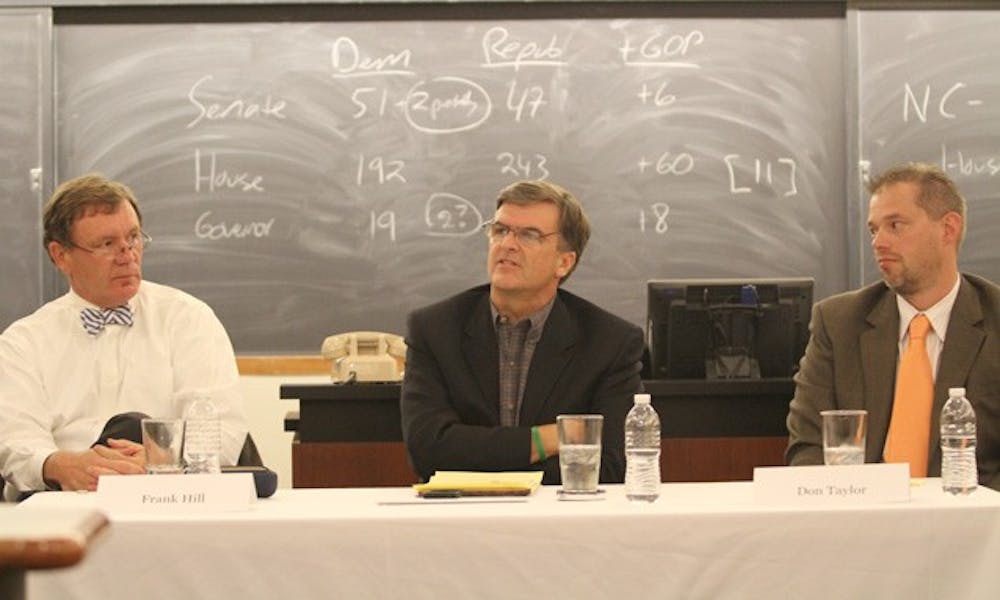After Tuesday’s midterm election, political and policy experts met at the Sanford School of Public Policy Wednesday night to discuss what the next two years will have in store for the country.
At the discussion, Frank Hill, director of the Institute for Public Trust in Charlotte and former chief of staff for former Sen. Elizabeth Dole, joined Pope McCorkle, an adjunct professor at Sanford and former Democratic analyst, in dissecting the turnover to Republican control across the country.
McCorkle said the “incumbency effect” still holds strong—although there was a turnover of 60 seats in the U.S. House of Representatives, he said the number was “large only by usual proportions” in the 435-member chamber. Democratic Sen. Harry Reid’s victory in Nevada, he explained, was only possible because he was an incumbent and could bring influential people to campaign for him. He added that the Democratic incumbents who lost Tuesday night were primarily those running in districts that they won in 2006 because of the unpopularity of former President George W. Bush and the Iraq war, as well as in 2008 as part of the wave of President Obama’s victory.
With Republicans now controlling the House, Democrats keeping the Senate and a Democratic president, some fear that the gridlock that has dominated Capitol Hill during the one-party rule will now intensify. However, Hill said gridlock “is democracy” because it forces the president and Congressional leaders to sit down and work out problems. He added that the circumstances will force compromise, especially since, as McCorkle explained, both parties underwent an ideological purification; the Democrats who lost were primarily conservative “Blue Dog” Democrats, leaving a more liberal Democratic party and a more conservative Republican party. Hill predicted that with the parties growing more ideologically polar and the increasing number of registered independents, a political landscape favorable to a third party could be created.
The results from the 2010 midterm can have long-lasting implications because the Republicans, who overwhelmingly gained control of state legislatures across the country, will now control the redistricting that will follow the 2010 census. McCorkle conceded that Republicans will have the advantage by controlling the redistricting process but that “both parties can outsmart themselves” in redrawing districts. Hill noted that in North Carolina, Republicans are getting an unparalleled opportunity to draw new districts because this will be their first time controlling both chambers since 1898.
McCorkle called the Tea Party movement “a social movement with political autonomy” that has the ability to actually force politicians to do things rather than just “whine about it.” He added that the Tea Party is composed primarily of reasonable people and that the “crazy and racist” elements usually portrayed are on the extreme fringes. The Democrats must recognize this, he said, if they want to regain power.
Each man had his own opinion about the biggest impact of the 2010 elections on the political landscape. Hill said he believed that the country is starting a 10-year transition period in which the politicians who entered during the Watergate and Reagan eras are starting to retire or be forced out as a younger generation of leaders rises to the helm. He added that the radical shift from 2008 to 2010 shows that “Americans do not know what they want” from government. McCorkle said the 2010 midterm elections are striking evidence that “we are not in the age of Obama.”
Get The Chronicle straight to your inbox
Signup for our weekly newsletter. Cancel at any time.

